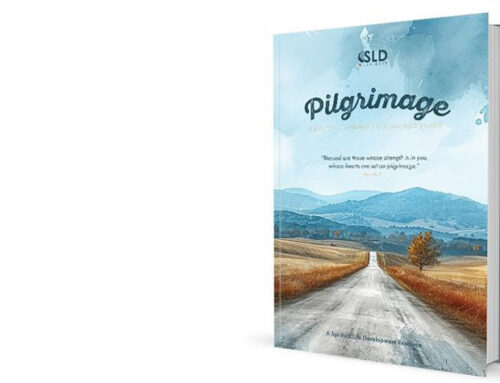Do you have your summer reading list ready? Can we make some suggestions? Below is a list of some books that the Spiritual Life Development Department would like recommend. Happy reading!!!
Chasing Francis
By Ian Morgan Cron, Zondervan Publishing
This is a fictional story about Pastor Chase Falson who has lost his faith in God, the Bible, evangelical Christianity, and his super-sixed megachurch. When he falls apart, the church elders tell him to step aside for a while so he can regroup and the church board decides what is in the church’s best interest.
Chase decides to visit his cousin, Kenny who is a Catholic priest and spiritual director living in Rome, Italy. Kenny discerns Chase’s vocational and spiritual burn out and sets out to help him find healing. He does this through a life-changing journey where, with a curious group of Franciscan friars, he struggles to resolve his crisis of faith by retracing the footsteps of St. Francis (Founder of the Franciscan Order, born at Assisi in Italy, in 1181), a man whose simple way of loving Jesus changed the history of the world.
If you have ever longed for God, but have questions, you are not alone. Centuries ago, the humble and joyful Saint Francis lead the spiritually hungry away from “dead religion” and back to God himself.
“Caution! Reading this book may cause spontaneous kindness, charity toward others, and a total overhaul of the way you think about what it means to be a follower of Christ.” Mark Batterson, author of the New York Times bestseller The Circle Maker
The Return of the Prodigal Son
by Henri J.M. Nouwen, Doubleday Publishing Group, Inc.
A chance encounter with a reproduction of Rembrandt’s The Return of the Prodigal Son catapulted a deeply personal spiritual adventure for Henri Nouwen. Experiencing this book may be the same for you.
The internationally renowned priest and author, respected professor and beloved pastor Henri Nouwen (pronounced Henry Now-win) wrote over 40 books on the spiritual life. The Return of the Prodigal Son is one of his books that masterfully intertwines three stories into one deeply spiritual adventure. The life of Nouwen himself, the life of Dutch artist Rembrandt (1606-1669) and the life of the Prodigal Son (Luke 15:11-31) are all brought together to gently teach love and compassion for the wondering soul which is in all of us.
Rembrandt’s painting The Prodigal Son so fascinated Nouwen that he embarked on a study of the painter’s life. He found Rembrandt lived most of his life as “a proud man, strongly convinced of his own genius and eager to explore everything the world has to offer. . .”. Nouwen discovers that The Prodigal Son was most likely one of his last paintings and speaks of his spiritual experience.
Henri Nouwen’s writing of this book is the outcome of a “crossroads” in his own spiritual experience and The Prodigal Son painting and its scripture base brought him through a spiritually dry period of his life to spiritual health.
The author skillfully reflects on how he and each of us as readers on a spiritual journey are like the younger prodigal son and older judgmental son, but concludes that each of us must become like the loving, forgiving Father.
The Pastor
By Eugene Peterson, HarperOne Publishing
A poignant memoir by bestselling author Eugene Peterson who discovered that being a pastor boils down to paying attention and calling attention to ‘what is here and now’ between people and the Lord.
Eugene Peterson is a gifted wordsmith. We know this from his bestselling paraphrase edition of the Bible, The Message. Millions have come to a better understanding of the Word of God through this work in what Peterson calls “American language”. The Pastor is an extravagant telling of his formation as a pastor and how the vocation of pastor formed him.
Peterson never planned to be a pastor, but shares that he now cannot imagine life not being one. He brilliantly weaves together what are seemingly random experiences that became the ongoing development of his calling as a pastor to various flocks in his life and ministry.
The Pastor does not deal in abstracts, but deals with the everyday physical world and shows how life is a holy space and time. The author takes on the mega-church model and presents a simple, faith-filled job description of what being a pastor means today.
Growing up in a Christian family in a small town in Montana laid the ground work for his life’s calling. Peterson writes “Along the way, I want to insist that there is no blueprint or file for becoming a pastor. In becoming one, I have found that it is a most context-specific way of life: the pastor’s emotional life, family life, experience in the faith, and aptitudes worked out in an actual congregation in the neighborhood in which she or he lives – these people just as they are, in this place. No copying. No trying to be successful. The ways in which the vocation of pastor is conceived, develops, and comes to birth is unique to each pastor.”
If you are in a pastoral role and lacking spiritual energy and needing focus or direction, The Pastor shares practical helps of encouragement through the real-life vocation of one man’s journey in God’s calling on his life. No wonder this book has become a “must read” for many seminary students today.
Going Deep
By Gordon MacDonald, Thomas Nelson
What’s a deep person? If you’d like to become one, would you know how? Would you like to help others become deep? If so, this is the book for you.
In this fascinating book, best-selling author of books like Ordering Your Private World, Who Stole My Church? and A Resilient Life, Gordon MacDonald discovers that his small New England could be headed for trouble. Why? Because of a serious shortage. There are plenty of good people, well-meaning people, sincere people-but not enough deep people.
In his celebrated style, MacDonald identifies the crucial missing component in his community” people of true depth, people of real influence. Then he offers unforgettable insights on how to cultivate spiritual maturity and exhibit life-altering faith.
As it turns out in MacDonald’s town-and probably yours-what’s needed is people who are willing to seek Christ passionately with a hunger to go deep. This may be exactly what you’ve been looking for.
The Fire of the Word
By Chris Webb, InterVarsity Press
There is a big difference between approaching God’s Word as a text book and a love letter. Reading God’s Word for transformation must come from the latter perspective. How does this happen?
Richard Foster, founder of the intrachurch movement, Renovaré shares the following reasons for reading Chris Webb’s book, The Fire of the Word:
- “First, this book is saturated with grace and mercy. The stories, the teachings, the allusions, the very feeling tones of the words themselves are soaked in grace and mercy. Grace and mercy given in good measure, pressed down, shaken together, running over. Chris writes, ‘From the first chapter of Genesis to the last chapter of Revelation, the Bible jubilantly proclaims grace to the world; an exuberant, life-embracing grace that exceeds anything we could possibly hope or imagine.”
- “Second, this book gives us a deep sense of reverence and awe before the majesty of Scripture. Chris gently leads us before the wonder of Scripture where the boundary between heaven and earth has been worn through.’ For all his exuberance over Scripture, however, Chris is careful not to fall into worshiping the Book. . . He knows that the purpose of the Bible is to lead us into an adoring love of the triune God – Father, Son and Holy Spirit. Worship belongs to Yahweh alone.”
- “Third, this book gives us insight into faith-filled living that often surprise us, pleasantly so. Chris’s stories surprise us. . . And more. Chris’s phrases and metaphors surprise us; he describes pride as ‘the all-consuming black hole of the soul”; he says of the Bible that ‘fire is trapped under the ink’; he reminds us that ‘sinners may have the wildest parties, but saints have the most fun.’ Drawing on an ancient Christian tradition , Chris’s reinterpretation and use of the Song of Solomon surprises us.”
The author teaches us to not only approach God’s Word with our heads, but with our hearts. This important balance teaches us to read the Scriptures in a fresh new way that will always lead to an encounter with its Author. This way of reading will take us beyond the everyday walk of faith to a journey that is ablaze with the living Word of God.




